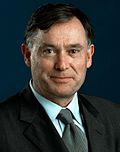Ministerpräsident of Großgermania
Prime Minister of Greater Germania Ministerpräsident von Großgermania | |
|---|---|
|
File:Grossgermania CoA.PNG ' | |
| Style | Excellency |
| Appointer | Michael von Preußen |
| Formation | 12 December 2008 |
| Website | http://ministerpräsident.reg.gß/ |
Where they are unavailable or not desired, the name may be represented as Ministerpraesident of Grossgermania.
The Prime Minister of Greater Germania (officially the Minister-President of Greater Germania, German: Ministerpräsident von Großgermania) is Großgermania's head of government.
The Constitution of Großgermania provides for a Ministerpräsident to be appointed by the Emperor. The Ministerpräsident shall preside over meetings of the Reichstag, and cast the deciding vote in case of deadlock. Under the German Empire, the position of head of government was held by a Chancellor (German: Reichskanzler), appointed by the Emperor, and who held only as much power as the Emperor granted him. Following the creation of the Weimar Republic, a Chancellor was provided for constitutionally. Adolf Hitler was appointed to the position of Chancellor in 1933, and in 1934 combined the position with that of Reichspräsident to become Führer (English: Leader).
In 1949, Germany was partitioned into the communist German Democratic Republic and the capitalist Federal Republic of Germany. In the Federal Republic, a Chancellor was once again granted the position of head of government; in East Germany, however, the position was jointly held by a Council of Ministers, represented by a Chairman. Upon the reunification of Germany in 1990, the German Democratic Republic became part of the Federal Republic of Germany, and the Chancellor thereof became the head of government of the entire country. The last President of Germany, Horst Köhler, assumed the title of Ministerpräsident of Großgermania upon unification of the Empire in 2008.
During the coup d'état in Großgermania in May to June 2009, Köhler continued to serve as Ministerpräsident, as well as becoming Regent of the Kingdom of Germany while deposed Emperor Michael von Preußen was in exile in Rome. Although the Office of the Ministerpräsident officially supported the election of Alexandra von Nassau as Empress, most people believed, and Köhler later claimed, that this was a political move only and that Köhler in reality supported Michael's claim to the throne. Following the return of Michael in June 2009 and Alexandra's subsequent surrender, Michael allowed Köhler to maintain his position, despite the removal from office of several other officials who supported the Reichstag's impeachment.
